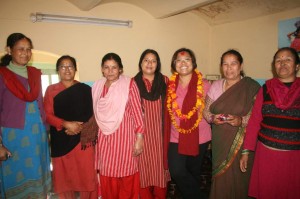A great blog post by Bec Ordish, Founder and Director of the Mitrataa Foundation in Nepal. Read on to find her thoughts and advice on choosing the right volunteering opportunities abroad.
As voluntourism increases in popularity, so do the inevitable scams which seek to take advantage of unsuspecting tourists. This is particularly the case in countries like Nepal where they are well-versed in ways to part tourists from their money! And to be fair, why not take advantage of a new industry when foreigners are throwing money at them! I think the tourists are just as much to blame for these scams –I do get frustrated that it is the disadvantaged people that the tourists often pat themselves on the back for helping out that are the ones who suffer the most. Don’t be fooled – it is often the middle-men making the money out of exploiting these people with little of it filtering through to the genuine people in need. So there are definitely steps that volunteers can take to be prepared and to avoid the scams.
- Work with well-respected organisations or ones that have been recommended to you by someone you trust. Don’t trust the recommendations online – many of them are not legitimate! There are some wonderful organisations out there but there are plenty of scammers as well. Many are actually not deliberately scamming you, they are just not effective in giving you the experience you are expecting to have.
- Do your research – find an organisation which fits with your passions, interests and skills. You will find that you feel more comfortable jumping in and sharing your passions than if you just sign up for anything that comes along. Often in these situations, you get shown a place and told to “entertain the kids” or “teach the people English” with little more guidance than that. If you are doing something you are interested in or experience with, it’s much easier to just take control and have a go!
- Be clear about what you expect from the organisation and what they expect from you. I have seen so many examples of people who come over saying “I am going to work in a children’s home” or “I am going to teach English to refugees”. I ask them how many children or people they will be teaching, what ages they are, their level of experience, how many hours a day/days a week will they be teaching and they have no idea. When they get here, either nothing has been organised and they spend half of their time here sitting around while their hosts try to work out what to do with them or they end up replacing an existing teacher who takes the opportunity to go on holidays and the volunteer ends up teaching 7 days a week for full days with no support.
If you are working through a consultant or agency, ask for contact with the organisation who manages the projects you will be working on too. Many consultancies don’t like this because they are worried you will do them out of a commission. Just reassure them that you need confirmation of the organisation to help you prepare etc. I had one this week where a volunteer consultant came to me to inform me that he had a new volunteer starting a our children’s home next week for a month. I told him, as I had told him many times before, that we didn’t accept volunteers from these agencies. He said, “But I have already told them all about you from your website and they are expecting to come.” I explained to him that he’d need to find somewhere else for them to go and that he had no right to lead them to expect they could work with us. It turned out that he had already taken money from these volunteers who were very angry, thinking we had taken the money and then refused to have them. I explained to them very clearly that we had never indeed received their information or CVs and that our process would never have allowed us to accept money for placing them. It’s not how we work.
There have also been increasing examples I have come across of people thinking they were coming over to teach English or work in a school/home/women’s group only to find out they were to be translating documents (or at least correcting the interesting English interpretations of translations) for a tourist agency or someone’s personal business. You might be happy to do this as long as it is what you were expecting to do!
- Be realistic – if you are coming for a couple of days and just want to cuddle some babies or play with some kids or paint a mural, then there are plenty of homes or organisations that will allow you to do that. But don’t expect to change the world or make a significant difference to them in that time – in fact, in many cases you are making it worse for them as they are kept in more pathetic looking situations to inspire you to hand over more money. Just remember that many before you and many after will come and do the same thing – in fact we’ve seen the same murals painted over and over again as a very enterprising organisation whitewashed the walls, accepted donations for painting murals from foreigners who went home with some great photos and feeling like they had made a huge difference, and then the organisation whitewashes them again and waits for the next group to take money from! But what’s the harm if everyone gets what they want!



Pingback: Selecting the right volunteering opportunity « Remarks on Volunteering
I have to say I have volunteered with my church to Nicaragua, which was phenomenal, with Cross Cultural Solutions to Costa Rica, where i was very dismayed that none of my funds went to toward materials for community projects – it all goes to CCS staff or the housing costs, and with Globe Aware assembling and giving away wheelchairs to landmine victims, which was life changing. i can only reiterate that it PAYS TO DO YOUR RESEARCH! thank yo forposting this.
Thanks for your response Lee.
It is definitely important to do your research. I met some girls while travelling who had left their very expensive volunteering placement because they were doing something completely different to what they had been told to do with no guidance or support. This was a large well reasonably known international charity too I won’t name and shame.
Actually speaking to people who have volunteered with the organisation abroad and getting their opinion is definitely a good way to start.
Jen